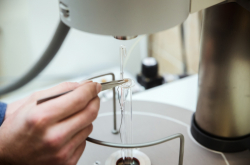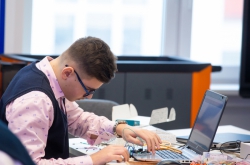This Master’s program is a new version of the old program called “Mathematical Models and Computer Simulation”, which has undergone significant changes. While the old program focused mainly on theory and applied mathematics, the new one combines theory and practice, which is beneficial for both students and the industry.
“Computer simulation systems are used in market research, marketing systems and IoT as building models and testing new approaches in a virtual environment can save resources. Companies now to compete for high-skilled specialists with experience in computer simulation technologies,” says Alexander Belokrylov, the BELLSOFT Company director.
What makes this program truly special is that its main focus is research. Fundamental programming, solving complex tasks, algorithms optimization: these are the things that await the students. Potential students are expected to be interested in conducting their own research. That’s why those who already have such experience will find it easier to join the program.

“Conducting a real experiment always requires some modeling, as it allows experts to predict risks. Computer simulation is now broadly used in medicine, business, and political sciences. The program offers many specialized courses for training IT specialists,” noted Olga Tykuchinskaya, program manager at T-Systems Russia.
The curriculum includes both basic courses, such as data processing and analysis, applied AI, machine learning methods, the theory of distributed and parallel computing, etc., and specific ones, such as parallel computing on OpenCL platform, forecasting models for computer systems, uncertainty in data analysis, etc. Some courses are taught in English, which will allow students to hone their English skills. In addition to traditional classes, students will work on various projects coordinated by representatives of the program’s partner companies.
The program is coordinated by leading scientists and IT specialists. Among the teachers are Professor Anatoly Demin, Doctor of Technical Sciences and one of the most award-winning experts in the field of computer simulation, Lyudmila Muravyova-Vitkovskaya, Candidate of Technical Sciences, Ivan Perl, Candidate of Technical Sciences, one of the coordinators of the program and a staff member of the Oracle Corporation, Svetlana Dmitrieva, Candidate of Technical Sciences, and PhD students Olga Kalenova and Ilya Isaev. Several IT specialists will also be invited to take part in the program as tutors.
To join the program, students are required to pass written entrance examinations in Software Engineering and the Basics of Computer Simulation. Note that this can be also done remotely. In 2018, there are 15 state-sponsored positions.

One of the main advantages of the program is that it gives students an opportunity to participate in a big international research project which focuses on developing platforms for system-dynamic simulation. The project is conducted in collaboration with the Massachusetts Institute of Technology and the University of California, Berkeley. SdCloud is an open-source project that was launched in 2015 and unites many people from all over the world.
“There is a set of commercial tools in system dynamics, but these tools are very expensive. And there are also non-commercial tools, which are unhandy to use as you have to download and install them first. We’ve just put these non-commercial tools on a cloud platform, and now people can enter the system, register, upload their models and get the results immediately, using only their browser. Now all you need is an idea. We must understand that IT-specialists are not the only ones using computer simulation technologies: scientists use them too, and it’s very important for them to have a reliable resource,” comments Ivan Perl, the program’s coordinator.
The sdCloud project team presents their work not only at top scientific conferences, such as the International Conference of System Dynamics but also at conferences for IT specialists, e.g. SECR (Software Engineering Conference in Russia).
The biggest challenge the team faces has to do with the limitations of an open-source format, but these difficulties can be overcome provided that big international companies support the project. The Saucelabs company from San-Francisco was the first to support the idea. Then it was followed by a German company GlobalSign which provided sdCloud with security certificates that guarantee a secure connection, and then by the Veesp data center company.

Practice plays a very important role in training future professionals. That’s why coordinators of the program offer their students numerous opportunities to apply their skills. The program includes a wide range of activities. For one, students will work on their own research projects, some of which will be conducted on the sdCloud platform, such as the sdCloud University project featuring an interactive system for teaching system dynamics. It is also planned that students will design models and present the results of their work to each other.
Apart from working on research projects, students will get a chance to participate in both short-term and long-term internships. For example, one of the research projects on the sdCloud platform conducted in collaboration with Thapar Institute of Engineering and Technology (India) was awarded the Russian Foundation for Basic Research grant, so now the future Master’s students can go to India to conduct their research there.
Computer simulation technologies are widely used in a range of industries, from medicine to climate control. Many big companies are interested in specialists in computer simulation. Students who have successfully completed the program can continue their education as PhD students both in Russia and abroad, or work in various big IT-companies, such as T-Systems, Yandex, and many others.




